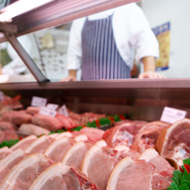
Researchers find lack of data for British-produced food
A systemic review of the available evidence on antimicrobial resistance (AMR) in food has confirmed the need for extra surveillance at retail level.
Produced by the RVC on behalf of the Food Standards Agency, the review looked at areas where consumers are more likely to get exposed to AMR in bacteria from the food chain.
Researchers examined published evidence between 1999 and May 2016 for meat, dairy, seafood and fresh produce sold in shops.
They found a lack of AMR prevalence data for British-produced food and, to a lesser extent, countries that export to the UK, with an exception of northern European food exporting countries.
‘Efforts should be made to develop surveillance programmes that will identify trends in the occurrence of AMR in foods and thereby provide a framework for assessing potential risks associated with exposure to such hazards among British consumers,’ the authors conclude.
The review makes several key recommendations, including:
• More research and surveillance to ascertain AMR levels in both foodborne and commensal bacteria in pork meat in the UK. The report found that data on AMR bacteria from British and imported pork meat in the UK are limited and dated.
• Continued research and surveillance efforts to monitor AMR trends in both foodborne and commensal bacteria in British and imported chicken, and poultry meats in the UK.
• Collect more complete information on the type of production systems from which food samples originate to assess the impact of animal husbandry practices as risk factors for resistance.
• More research and surveillance to establish and quantify the risk of transmission of AMR for critically important antimicrobials in organisms from foods of animal and non-animal origin to humans.
In the study, researchers examined a total of 304 papers from 58 different countries.
From the UK, the team analysed 15 studies including eight original articles, five surveys conducted by the FSA, and two surveillance reports that assessed the occurrence of AMR in relevant foodborne pathogens (Salmonella spp. and Campylobacter spp) and commensal bacteria in pork and poultry meat.
‘There was a paucity of AMR data for domestically-produced food in the UK. Also, the lack of surveillance data (apart from those available through the surveillance reports of the European Food Safety Authority [EFSA]) did not allow the detection of trends in AMR in food in the UK; such data would be relevant for risk assessment of exposure to British consumers,’ the authors explain.
‘The targeted FSA retail surveys conducted since 2001 provide “snapshots” of AMR in relevant foodborne pathogens (Salmonella spp. and Campylobacter spp.) in red meat and poultry meat. There is, nevertheless, a lack of AMR data on commensal bacteria in food at retail level in the UK.’



 The Federation of Independent Veterinary Practices (FIVP) has announced a third season of its podcast, Practice Matters.
The Federation of Independent Veterinary Practices (FIVP) has announced a third season of its podcast, Practice Matters.